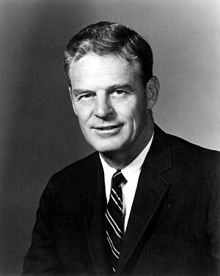Ed Gurney
| Edward John Gurney | |
|---|---|
 |
|
|
United States Senator from Florida |
|
|
In office January 3, 1969 – December 31, 1974 |
|
| Preceded by | George Smathers |
| Succeeded by | Richard Stone |
| Member of the U.S. House of Representatives from Florida's 5th district 11th (1963-1967) |
|
|
In office January 3, 1963 – January 3, 1969 |
|
| Preceded by | Constituency established |
| Succeeded by | Louis Frey, Jr. |
| Personal details | |
| Born |
January 12, 1914 Portland, Maine |
| Died | May 14, 1996 (aged 82) Winter Park, Florida |
| Political party | Republican |
| Alma mater |
Colby College Harvard Law School Duke Law School |
| Religion | Congregationalist |
| Military service | |
| Service/branch | United States Army |
| Years of service | 1941–1946 |
| Rank | Lieutenant Colonel |
| Battles/wars | World War II |
Edward John Gurney (January 12, 1914 – May 14, 1996) was an attorney and an American politician based in Florida, where he served as a Representative and a United States Senator. Born and reared in Portland, Maine, Gurney moved to Florida after his service in World War II. Becoming active in politics in the Democratic Party, he shifted to the Republican Party before being elected to the House of Representatives in 1962, the second Republican elected to Congress from Florida in the 20th century.
In 1968 Gurney was elected as the first Republican Senator from Florida since Reconstruction. Following his indictment in an influence peddling scandal, he resigned December 31, 1974. Eventually he was acquitted of all charges. After being defeated in a run for Congress in 1978, Gurney retired from politics and resumed his law practice.
Gurney was born in Portland, Maine in 1914. He attended public schools and graduated in 1935 from Colby College in Waterville, Maine. He graduated in 1938 from Harvard Law School. He was admitted to the Bar of New York the following year and began practicing law in New York City.
After the United States entered World War II, Gurney enlisted as a private in the United States Army. He was commissioned as an officer and saw action in the European Theatre of conflict. By the time of his discharge in 1946, he had achieved the rank of lieutenant colonel.
...
Wikipedia
